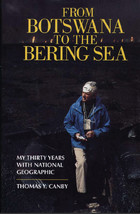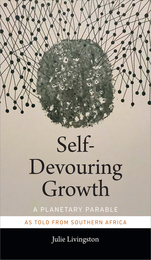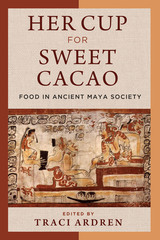

National Geographic has been called a window on the world and a passport to adventure. Each month an estimated forty million people in 190 countries open its pages and are transported to exotic realms that delight the eye and mind. Such widespread renown gives the magazine's writers an almost magical access to people and happenings, as doors that are closed to the rest of the journalistic world open wide.
Thomas Y. Canby was fortunate to be a NationalGeographic writer and science editor from 1961 to 1991, a time during which the Society's ventures and size grew by leaps and bounds and the resources available to staff were seemingly limitless. In From Botswana to the Bering Sea, he gives readers an on-the-ground look at the life of a National Geographic field staffer and an insider's view of the fascinating dynamics within the magazine's editorial chambers.
Canby's assignments dealt largely with issues of global concern, and his travels took him to the farthest reaches of the planet. This book gives the reader the visas and tickets to share in Canby's experiences -- from a Filipino rice harvest capped by a feast of deep-fried rats, to impoverished villages of Asia and Africa gripped by the world's most widespread famine, to seal hunting and dog sledding with Eskimos in the Canadian high Arctic. Readers match wits with paranoid guardians of the secret Soviet space program; skirt land mines in the flaming oil fields of Kuwait; and dodge death while scuba diving to an archaeological site in a Florida sinkhole. The book also gives insight into the magazine's inner workings: how article subjects are chosen; how writers are assigned and interact; how prolonged trips to impossibly remote destinations are planned; how staffers operate in the field.
Working for National Geographic has been called "the best job in the world." From Botswana to the Bering Sea describes that unique job, and answers from first-hand knowledge the question Canby and his colleagues are so often asked: "So, what is it like to work for National Geographic?"


The chiefs initially went to England to persuade Queen Victoria not to give their lands to ruthless Rhodes and his British South Africa Company. Abandoned by the Secretary of State for the Colonies, Joseph Chamberlain, and denied an audience with the queen, the three rulers decided to tour the British Isles to plead their case to the populace. Appealing to the middle-class morality of Victorian society, the chiefs were remarkably successful in gaining support, eventually swaying Chamberlain into drafting the agreement that secured their territories against the encroachment of Rhodesia.
Historian Neil Parsons has reconstructed this journey with the help of African archival materials and news clippings from British papers, garnered from the clippings service the chiefs had the foresight to employ. In equal parts narrative of pilgrimage, voyage of discovery, and colonial resistance, King Khama, Emperor Joe, and the Great White Queen provides a view from the other side of colonialism and imperialism. It demonstrates the nuances of cultural and religious interaction between Africans and Europeans, and it does so with the richness and depth of a fully realized novel.

Traditionally, social scientists have assumed that past imperialism hinders the future development prospects of colonized nations. Challenging this widespread belief, Matthew Lange argues in Lineages of Despotism and Development that countries once under direct British imperial control have developed more successfully than those that were ruled indirectly.
Combining statistical analysis with in-depth case studies of former British colonies, this volume argues that direct rule promoted cogent and coherent states with high levels of bureaucratization and inclusiveness, which contributed to implementing development policy during late colonialism and independence. On the other hand, Lange finds that indirect British rule created patrimonial, weak states that preyed on their own populations. Firmly grounded in the tradition of comparative-historical analysis while offering fresh insight into the colonial roots of uneven development, Lineages of Despotism and Development will interest economists, sociologists, and political scientists alike.

Winner of the Mormon History Association Best International Book Award
The Church of Jesus Christ of Latter-day Saints continues to contend with longstanding tensions surrounding gender and race. Yet women of color in the United States and across the Global South adopt and adapt the faith to their contexts, many sharing the high level of satisfaction expressed by Latter-day Saints in general. Caroline Kline explores the ways Latter-day Saint women of color in Mexico, Botswana, and the United States navigate gender norms, but also how their moral priorities and actions challenge Western feminist assumptions. Kline analyzes these traditional religious women through non-oppressive connectedness, a worldview that blends elements of female empowerment and liberation with a broader focus on fostering positive and productive relationships in different realms. Even as members of a patriarchal institution, the women feel a sense of liberation that empowers them to work against oppression and against alienation from both God and other human beings.
Vivid and groundbreaking, Mormon Women at the Crossroads merges interviews with theory to offer a rare discussion of Latter-day Saint women from a global perspective.


In the year 2000 the World Health Organization estimated that 85 percent of fifteen-year-olds in Botswana would eventually die of AIDS. In Saturday Is for Funerals we learn why that won’t happen.
Unity Dow and Max Essex tell the true story of lives ravaged by AIDS—of orphans, bereaved parents, and widows; of families who devote most Saturdays to the burial of relatives and friends. We witness the actions of community leaders, medical professionals, research scientists, and educators of all types to see how an unprecedented epidemic of death and destruction is being stopped in its tracks.
This book describes how a country responded in a time of crisis. In the true-life stories of loss and quiet heroism, activism and scientific initiatives, we learn of new techniques that dramatically reduce rates of transmission from mother to child, new therapies that can save lives of many infected with AIDS, and intricate knowledge about the spread of HIV, as well as issues of confidentiality, distributive justice, and human rights. The experiences of Botswana offer practical lessons along with the critical element of hope.


READERS
Browse our collection.
PUBLISHERS
See BiblioVault's publisher services.
STUDENT SERVICES
Files for college accessibility offices.
UChicago Accessibility Resources
home | accessibility | search | about | contact us
BiblioVault ® 2001 - 2025
The University of Chicago Press









